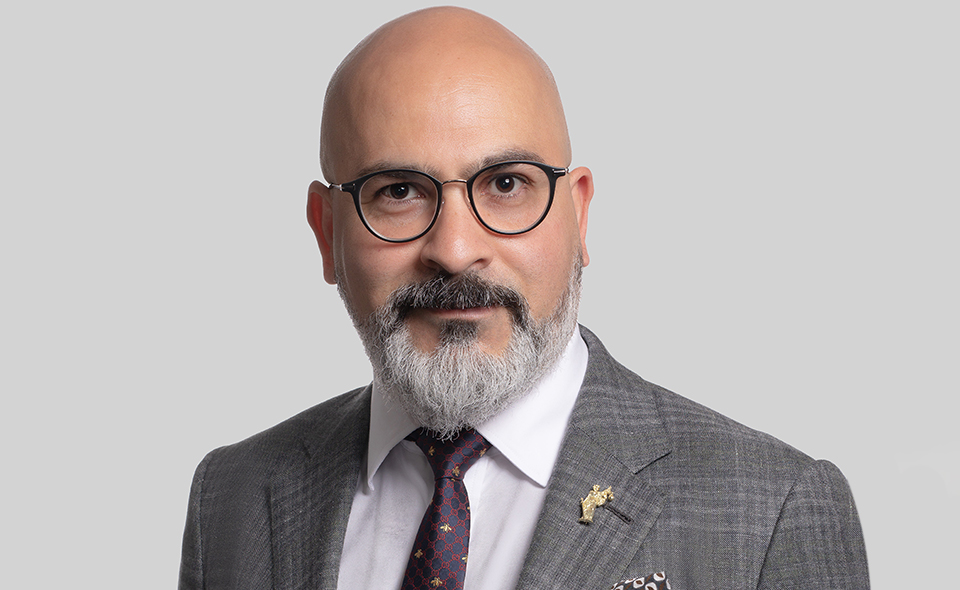Below, Afshin imparts his unique perspective on this sector and on what less experienced lawyers can do to emulate his success.
Please tell us a little about your journey into law. When did you first decide to pursue a career as a lawyer?
I decided to be a lawyer at age 16, then studied hard to pass the law school entry exam. There was not much support, as I lost my father and later my mother. I got my Bachelor’s degree in Law at age 22, then continued my education and obtained a Master’s degree in Law. Around age 24, I passed the bar exam in Iran when I was working at law schools as an instructor. Around age 28, I got married and moved to the United Arab Emirates (Dubai) and started my career as a legal consultant and university instructor there until I immigrated to Canada with my wife in 2012.
My journey into law is continuing and has never stopped. In all, I studied law for over 20 years and obtained multiple degrees in the field.
In what ways did your practice change when you moved from Iran to Canada?
Well, I moved from Dubai to Canada – Dubai was the second stop of my journey. Canada was a fresh start for me. I had to study law again and it took six years to get back to the field. I started from the scratch, but I used all my international experience to make it work.
It was easy to figure out that there were many people like me who wanted to immigrate to Canada. Canada receives approximately half a million immigrants every year, so it was clear that immigration law would be one of the major fields of legal services in Canada. To become a lawyer in Canada, I studied for a Master’s degree in Law at Osgoode Hall Law School at York University, and I received my Certificate of Qualification from the National Committee of Accreditation of the Federation of Law Societies of Canada. I then wrote the Barrister and Solicitor Examinations in Ontario, Canada.
How did you become proficient in immigration law?
First, I had to work on my own immigration application. I served as corporate counsel at two of Canada’s largest immigration service providers: Golden Group and WWICS. I studied an immigration consultant diploma, and before being a lawyer in Canada, I became a regulated immigration consultant. Being an immigration consultant helped me to pay for my law school expenses and gain significant experience in Canadian immigration matters.
Canada was a fresh start for me. I had to study law again and it took six years to get back to the field.
In Canada, immigration law is not a mandatory course in law school, therefore it is like a self-studied field of law. My immigration consultant diploma was an intensive six-month program. This is the reason I am proficient in Canada immigration law.
In the past, you have said that the most important thing for newly arrived immigrants to focus on is becoming part of a community. Can you expand on this?
Adaptability is one the main factors for successful immigration. Adaptability, by definition, means one's ability to change, or be changed, to fit different circumstances. For the purposes of immigration, adaptability is the immigrant’s ability to adjust to life and prosper in their new home. Social integration is the process during which newcomers are incorporated into the social structure of the host society – in our case, Canada. The good thing about Canada is the country has a very clear road map for all new immigrants. As I did, newcomers must simply follow it.
Integrating is the most important step of the whole immigration process. For example, I learned the Canadian culture by going to language schools and universities. I spent almost five years on my Canadian education. As an immigration lawyer, I always guide my clients on how to become a part of the community in Canada.
What developments are you currently observing in the immigration space? What trends do you expect to see in the coming years?
Although the government of Canada is planning to receive around 1.5 million immigrants before the year 2025, the figure is less than 1000 people annually under business immigration systems such as the self-employed or start-up visa programs. In this context, Canada's immigration policy has been heading south since 2014. While I am not against refugee, I do not understand why the government of Canada prefers to receive refugee claimants rather than entrepreneurs and investors.
Some of my current concerns are:
- Mass refusals of temporary residence visas such as work permits, study permits, and visitor visa applications by using Excel BASE-assisted software Chinook;
- The unfair strategy of refusing visa applications to empty the IRCC’s backlog;
- Making it difficult for international students and skilled workers and even entrepreneurs to immigrate to Canada, pushing them to become refugee claimants;
- Gambling with applicants and their representatives by refusing their visa applications and letting them take the refusal to the Federal Court if they can afford it.
Would you say that you have a particular creed or philosophy that influences the way you work?
Perfectionism is what I believe in. I insist on perfection and accept nothing shy of flawlessness. perfectionism is the persistence of will in obtaining the optimal quality of spiritual, mental, physical and material being. I am a huge perfectionist and always have been, so I have high expectations. To me, being a risk taker means trying new things and learning from my mistakes. I learned from my mistakes in Iran and Dubai, and even in Canada.
In Canada, immigration law is not a mandatory course in law school, therefore it is like a self-studied field of law.
The purpose of my life is to become a perfect human being before I die. I live in such a way that I understand tomorrow could be the last day of my life. My work must be done must be done now, because tomorrow might be late.
How does your pro bono work complement this?
As perfectionism is the persistence of will in obtaining the optimal quality of spiritual, mental, physical and material being, I believe pro bono work helps me to polish my spiritual and mental wellness. The need to be a responsible human being always pushes me to contribute more and provide pro bono work to those who are in need. I have a foundation organisation called the YLG Foundation and I donate around $50,000 annually to fight against poverty and illiteracy.
“Human beings are members of a whole
In the creation of one essence and soul
If one member is afflicted with pain
Other members uneasy will remain”
- Persian poet Saadi Shirazi
Volunteering legal expertise pro bono not only helps society, but it also makes me better at my jobs.
Is there a particular piece of advice that you would give to a less experienced immigration lawyer looking to emulate your success?
The opportunities for talented immigration lawyers in Canada will be both endless and demanding. Skilled practitioners know that immigration law is more than filling out forms. In fact, good service requires imagination, attention to detail and ‘soft skills’ that can help clients as they navigate the immigration process and begin to call Canada home.
Immigration practitioners are integral to the support that new economic immigrants need. Business and enterprise immigrants to Canada understand the significance of the opportunity to establish roots here, and this is where soft skills can combine with strong practice skills and knowledge to make a big difference for clients and their businesses.
What, then, is the extra dimension that good immigration lawyers can bring to the table to help them stand out in an area of specialty where there is both lots of demand and lots of competition? Here are a few ideas:
Go beyond
A good immigration lawyer will be thorough and meticulous, of course; meeting deadlines, preparing and filing applications and documents and following through to ensure that applicants are successful. A great lawyer does more, however. Immigration law is different from almost every other area of practice. Prospective clients seek a specific outcome: they want to immigrate to Canada — but they do not necessarily know how to navigate the system to get there.
This is where a great immigration lawyer can go above and beyond. Find out what motivates your client to want to set up in Canada. Is it sheer economic opportunity, hardship or duress in the home country, friendship with others from the old country who have already come to Canada, or a combination of these? The more you understand your client, the better you can apply your expertise to find the most effective legal pathway.
The purpose of my life is to become a perfect human being before I die.
A great immigration lawyer knows not only what clients need in terms of paperwork, but where their dreams are heading. Helping clients is a bit like chess — you have to be creative and think several moves ahead.
Be culturally sensitive and empathetic
Even for those arriving with skills or investment funds to a friendly, relatively welcoming country like Canada, immigration can still be hard. Lawyers need a good ‘deskside manner’ as much as doctors and nurses need bedside manner. Put yourself in the clients’ shoes. Take time to understand how issues are discussed and business is done in their culture and be direct and clear in how you communicate with clients. For example, it is particularly important to be transparent and upfront about how clients are billed and what services they are receiving. Be aware of religious and cultural holidays, sensitive subjects, etiquette and protocol too.
Also, go the extra distance. Twice a week, for example, I conduct a live (online) question-and-answer session at no charge for people who need general information about immigrating to Canada. Regardless of whether all become clients, all will appreciate the help.
Play the long game
Helping people move to Canada and set up business can be just the start of a long and positive professional relationship. Businesses need help growing and expanding markets as well as building networks and relationships. Think of the immigration law work you do for clients as a start, not the end.
Great immigration lawyers understand their clients’ whole picture — their challenges and obstacles and their hopes and dreams. It is the way to do what is best for those clients, your firm and ultimately for Canada too.
My own experience as an immigrant to Canada is instructive. I arrived in the country in 2012 after being educated and practising and teaching law in the Middle East. I became interested in Canadian immigration practice as I worked through my own application file.
As I mentioned before, even with my legal experience, as an immigrant I had to start over. I worked as a regulated Canadian immigration consultant, and after living and working in Montreal and Vancouver and earning my LLM at Osgoode Hall Law School in Toronto, I was called to the bar in Ontario in 2019 at 40 — a fresh start.
This kind of fresh start has challenges. But for newcomers, a fresh start in Canada is also a gift that must be cared for and nurtured. Law firms are not always seen by everyone as support services the way social service agencies or health clinics are regarded, but a good, strong relationship between lawyers and their newcomer clients can be just as important.
[ymal]
Can you tell us anything about what 2023 will hold for your practice?
I just expanded my immigration law practice in California, USA. My agenda for the coming year is to study for another Master’s degree in Law and become an attorney in the state of California. Then YLG can provide both Canadian and American immigration services to its clients.
What is the key element of your success?
I am a self-made entrepreneur. I am a risk taker. I do not live in my comfort zone.
I have started from scratch three times. The first time was in Iran; I became a lawyer around age 24 and built my first platform to jump into another level. I worked 18 hours a day. My next stop was Dubai; I moved to the country around age 28 to work in an international capacity. Working in Dubai afforded me significant international market experience as well as a financial stability that prepared me to move to another scope of my professional life.
I came to Canada in 2012 under the Quebec Skilled Worker program. From the first day, I wanted to be a Canadian lawyer. It took me six years to complete all my courses, study a Master’s degree in Law, pass the bar exam and finally become a lawyer in Canada. Even now I am taking the next step and will become a US attorney before the end of 2023.
Just to understand the level of liability that I take as of today, the business expenses of YLG are around $700,000 per month. Believe me, that is a lot in Canada.
Beside YLG, I also run some other businesses: TIARCH Construction, Ustartup, YLG Media, YLG Business Angle Investor, and also recently a satellite television channel.
What motivates you to achieve the best possible results for your clients?
Helping them to achieve their goals is my main motivation. I get a great deal of satisfaction out of helping to solve problems for my clients. I always remind myself that they have asked for my help and trusted in me. Besides that, client satisfaction and my good reputation are important. My client’s success is my success!
Afshin Yazdani, President
1050-5255 Yonge Street, Toronto, ON, M2N 6P4, Canada
Tel: +1 855-954-7222 | +1 647-402-7774
Fax: +1 416-224-8527
Afshin Yazdani is a business immigration lawyer and entrepreneur in Ontario, Canada. With an international law background and exclusively accepting clients who want to immigrate to Canada under business and corporate immigration categories, he stands unique among Canadian lawyers. Afshin founded Yazdani Law Group (YLG) in 2019 in Toronto, and the firm has since grown rapidly, opening four additional branches in Tehran, Shiraz, Vancouver and Los Angeles. Today, YLG has over 60 full-time employees and handles over 400 cases annually.





















